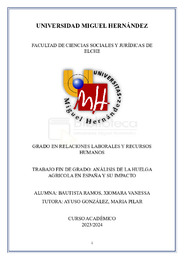Resumen :
Este presente trabajo, tiene como objetivo reflejar a través de la investigación, realizando un análisis de cómo se regula la huelga, en el ordenamiento legal y el respectivo régimen jurídico del derecho de huelga en España. Este análisis se centra, en primer lugar, en el estudio del concepto de huelga, tanto antes como después del desarrollo de la Constitución Española, de continuo se analizará su regulación en el marco normativo español, tanto en el Real Decreto Ley de las Relaciones de Trabajo 17/1977, de 4 de marzo la cual está vigente una regulación preconstitucional, artículo 28 de la Constitución Española y la doctrina del Tribunal Constitucional sobre la sentencia constitucional 11/1981 de 8 de abril, además se analizará el tema central de este año 2024, la huelga de los agricultores y ganaderos, analizando los movimientos originados en España, lo que establece la política agraria europea, y cómo ha actuado el gobierno español en respuesta de esta. El motivo principal de la elección de este tema es debido a que en la actualidad se están presenciando, diversas huelgas de gran importancia, las cuales están movilizando a los ciudadanos para defender sus derechos, debatir y dar a conocer su descontento con las decisiones tomadas a nivel nacional como internacional, por ello es importante conocer el hecho de que hay detrás de todo esto, y no solo lo que se puede conocer por redes sociales o por escucha activa del entorno.
This present work aims to reflect, through research and analysis, how strikes are regulated in the legal system and the respective legal regime of the right to strike in Spain. This analysis focuses, first of all, on the study of the concept of the strike, both before and after the development of the Spanish Constitution, its regulation will be continuously analyzed in the Spanish regulatory framework, both in the Royal Decree-Law of Relations of Work 17/1977, of March 4, which is in force with a pre-constitutional regulation, article 28 of the Spanish Constitution and the doctrine of the Constitutional Court, constitutional ruling 11/1981 of April 8, in addition, the central theme of this year 2024 will be touched upon, the farmers' and ranchers´ strike, analyzing the movements originating in Spain, what establishes the European agricultural policy, what is damaging it and how the affected countries are acting during this movement. The main reason for the choice of this topic is due to the fact several strikes of great importance are currently being witnessed, which are mobilizing citizens to defend their rights, debate, and make known their discontent with the decisions taken at the national and international level, so it is important to know the fact behind all this. And not only what can be known through social networks or by active listening to the environment.
|
 La licencia se describe como: Atribución-NonComercial-NoDerivada 4.0 Internacional.
La licencia se describe como: Atribución-NonComercial-NoDerivada 4.0 Internacional.
.png)
